







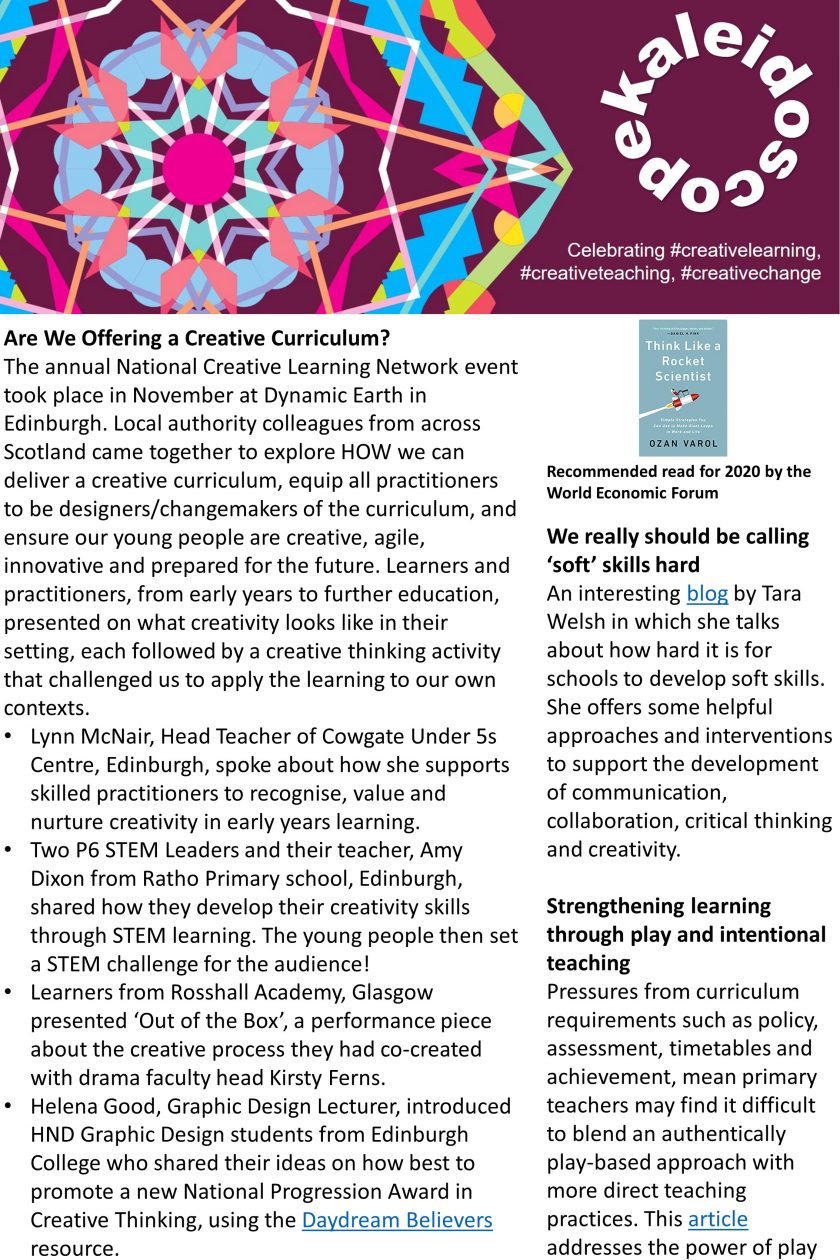
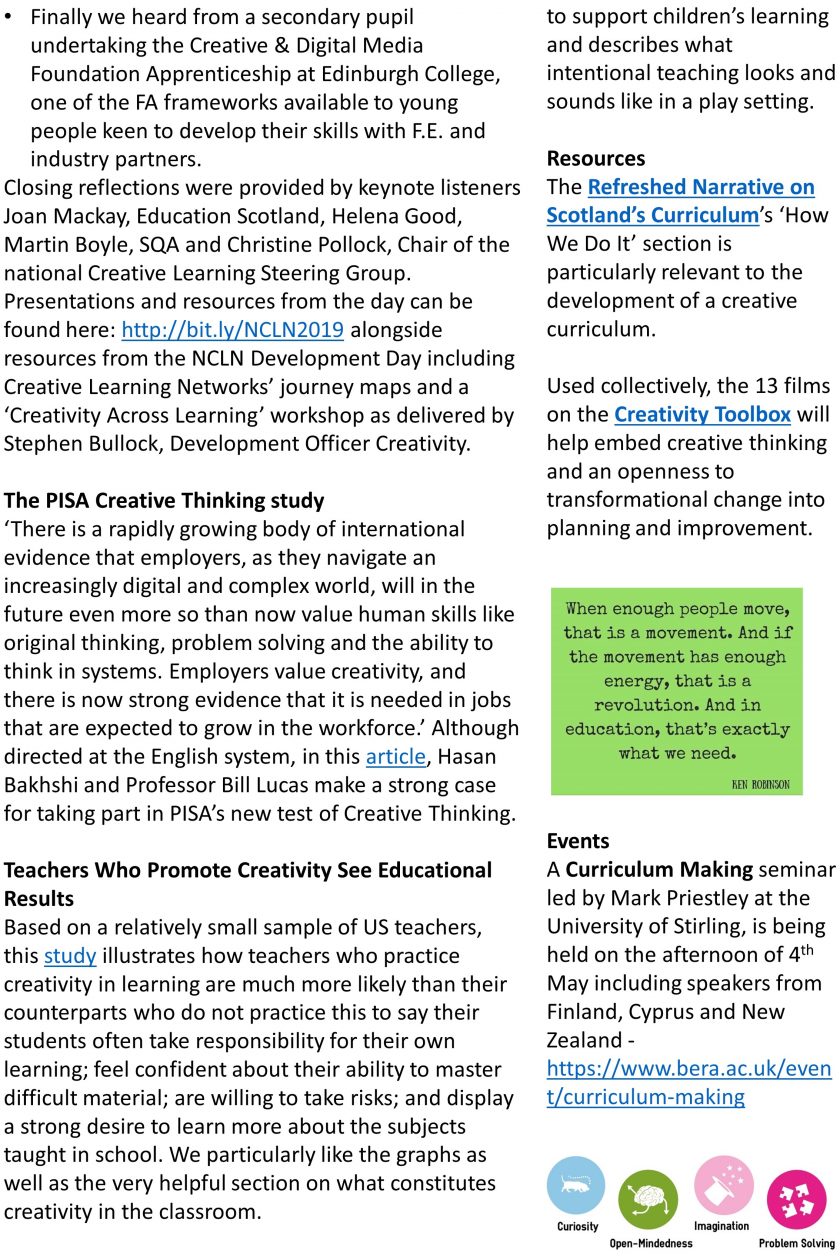

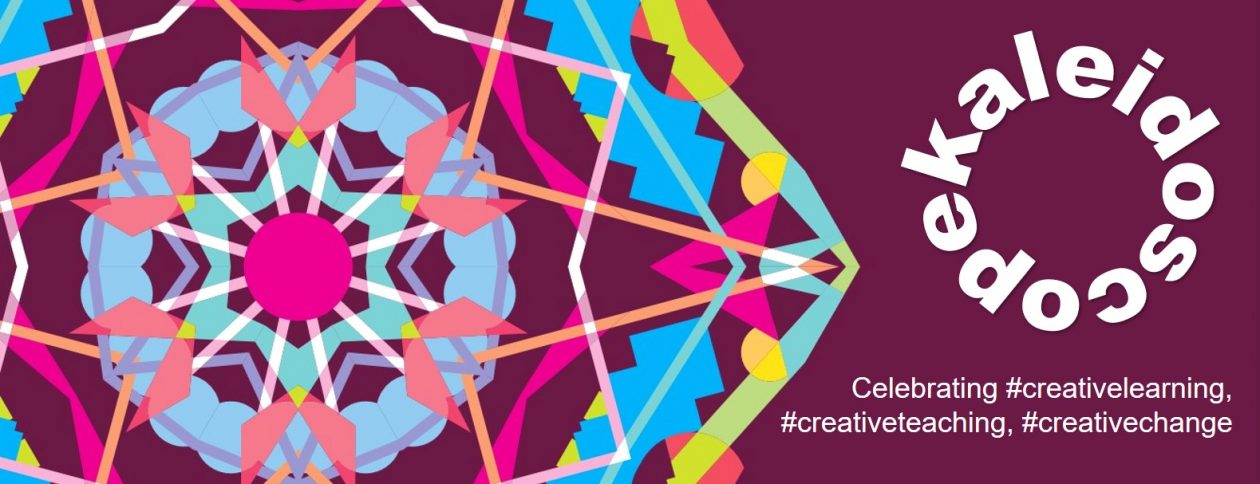
| National Creative Learning Network Development Day
Breaking expectations inspires creativity, so our recent National Creative Learning Network Development Day was held at Edinburgh Zoo, one in a series of interesting venues including a velodrome (Emirates Arena, Glasgow), Codebase in Falkirk, and Falkland Palace in Fife. Colleagues from Aberdeen and North Lanarkshire talked about programmes of work supported by the Creative Learning Network Fund. Margaret Stewart, Aberdeen City, shared the story of how consistent messaging and building on successful models of practice has resulted in an exciting new venture in a local primary school which has committed to embedding creativity in its practice. Pauline O’Neill, North Lanarkshire Council, shared two innovative DYW projects, one designed for young people ‘at risk’ and the other to support Christmas leavers into positive destinations. Partnerships with local businesses and industry are a strong feature of both projects and contribute to successful outcomes. Presentations from the day can be found here : https://creativityportal.org.uk/?q=edinburgh+zoo Resources! Check out Education Scotland’s YouTube channel for our creativity focused animations. There are ten in total which cover a range of topics from ‘Why teach creativity skills?’ to ‘Do creativity skills challenge prejudice and gender bias?’ Find out more. Big Meet with Ollie Bray Ollie Bray, former Headteacher of Kingussie High School and now Director/Initiative Lead: Connective Play and Education at The LEGO Foundation, Denmark, recently led a professional learning event in Glasgow. Through active participation, he illustrated how play and creativity are essential elements of engaging learning. He also reflected on Kingussie’s success story, highlighting the importance of bringing creative and innovative approaches to curriculum planning. You can read more about his work here: https://www.gtcs.org.uk/News/teaching-scotland/76-bray-the-master-builder.aspx https://www.legofoundation.com/media/1664/creating-creators_full-report.pdf
Find out more about the Creative Learning Networks here: |
Did you know…..?
Registration for the Scottish Learning Festival 2019 is now open. Everyone is welcome to attend this free event. This year new features have been introduced, including Twilight sessions for those who can’t make it along during the day. Articles Lateral thinking: David Epstein explains how Nintendo’s Game Boy was a case of “lateral thinking with withered technology” Project Based Learning (PBL) accelerates creativity through sufficiently structuring learning goals and requirements while allowing students to choose between differentiated options. Here’s your very own PBL test drive. Collaborative Problem Solving : Scotland’s Creative Learning Plan lists Problem-Solving as one of the four core creativity skills. This summary of research literature tells us that when structured well, problems can reinforce knowledge and improve attainment, as well as prepare children for the future workplace. NEW RESOURCES: How Can Creativity Support STEM? This two minute animation explores how. Do you have an interesting piece of practice to share? Please get in touch! |


| Imagine if….Approaching the curriculum creatively
Our recent National Creative Learning Network event focused on the curriculum. We wanted to know what young people think of the totality of the education offer they experience and how it might be improved. ‘The young contributors were fantastic. They were really clear about what they felt they needed from school education and teachers and also about what they had to give’ (participant) Our two ‘must haves’ were:
You can read the full story here: How we really listened to learners and find out how to deliver your own Imagine If… event here:
This month CLN Coordinators met together at Codebase in Stirling for a development day focused on sharing practice. Colleagues from Edinburgh, West Lothian, Angus and Stirling talked about programmes of work supported by the Creative Learning Fund. The four very different approaches shared prompted rich dialogue and enabled us to explore the importance of long-term strategy; embedding creative teaching and learning; using creativity to challenge classroom ‘norms’ and a design thinking approach to help practitioners visualise the creative process. Find out more about the Creative Learning Networks here: |
Did you know…..?
World Creativity and Innovation Day takes place Enterprising Educator – DEADLINE WEDNESDAY! Scotland’s Enterprising Schools has been working in Articles Author Angie Lake explains why STEM and arts subjects are both important in the world – you might find this a useful article to share with young people. Head of Gray’s School of Art in Aberdeen, Libby Curtis, discusses the importance of creativity and culture within society. Finland, Switzerland and New Zealand lead the way at teaching skills for the future. Read more about the provision of future skills education here. NEW RESOURCES: How Do We Assess Creativity Skills? This two minute animation explores how. Foundation Apprenticeships This quick guide offers helpful information for educational practitioners to learn more about Foundation Apprenticeships, the benefits they offer pupils and how schools in Scotland are delivering them. Parent Toolkit Children, now more than ever, need to understand how to evaluate changing information, respond creatively when problems arise, and be prepared for the jobs and opportunities of the future. Parent Toolkit offers some suggestions to help build learners’ cognitive flexibility.
Do you have an interesting piece of practice to share? Please get in touch! |

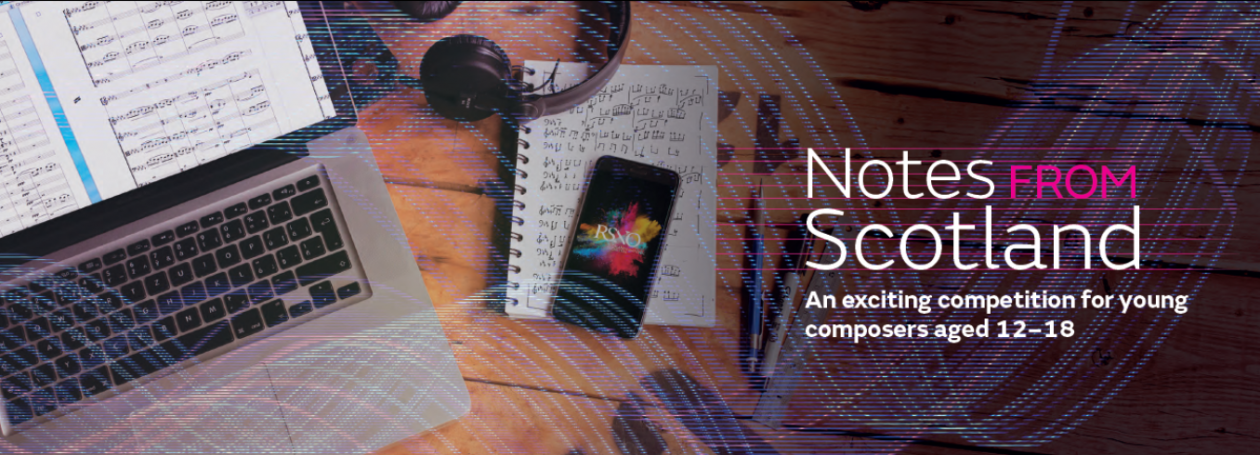
Royal Scottish National Orchestra
Notes From Scotland: A national competition for young composers
Attend an afternoon of workshops to gain top composing tips from experts, before submitting a short work for an instrumental trio, quartet or quintet. Whether you’ve been composing for a long time or you are just starting and are interested in learning a little more about compositional techniques, book your place now!
Notes from Scotland 2019 Flyer
Notes From Scotland – FREE Workshop
Saturday 18th May 2019
13.00 – 17.00
New Auditorium, RSNO Centre, G2 3NX
This workshop is open to all abilities. To sign up for a free place at the workshop afternoon please visit rsno.org.uk/engage/notes-from-scotland/ to download the booking form.
(Please note, attendance at the workshop is not compulsory to enter the competition)
Workshop bookings are now open!
Competition entries will be shortlisted and five finalists will have their piece played musicians from the RSNO in a live final on Saturday 22nd June 2018.
Competition entries open 1st May and close 31st May 2019 at 5pm.
For further details please see attached flyer or visit rsno.org.uk/engage/notes-from-scotland/
You are receiving this email as you are currently on our Learning and Engagement mailing list for updates about RSNO activities.
If you do not wish to receive these types of emails in the future simply reply to this message to unsubscribe.
|
The Scottish Education Awards recognise early learning and childcare settings and schools that have developed a vibrant and progressive culture and climate of continuous innovation. There are 15 award categories in total.
From 2013 onwards the Awards featured a Creative Learning Award category with notable shortlisted winners from primary, early learning and childcare, and secondary schools. Last year we took the awards a step further by embedding creative teaching, creative learning, and creative improvement in all of the award categories, and with a focus on creativity skills within a new Employability and Creativity Skills across Learning category.
You may wish to submit a nomination or encourage nominations from your authority/area for this award which recognises establishments that promote the development of employability and creativity skills for pupils and staff in partnership with the wider school community across all contexts and settings where young people are learning.
Find out more and make nominations by 6pm on Thursday 14 February here:
http://www.scottisheducationawards.co.uk/categories-employability.html
Please read the guidance notes incorporated into this page which explain what information should be provided.
For information about the Scottish Education Awards and all fifteen categories, visit the website here:
| Open House Thursdays
Turn up – be creative – do your own thing |
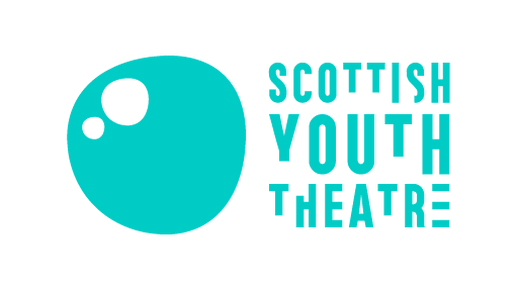 |
| One Thursday night every month, we invite young people aged 16 – 25 to use our Glasgow venue for free, to be creative in their own way. It should be related to the performing arts, so you can rehearse, improvise, experiment across art forms – whatever you choose… just come along! |
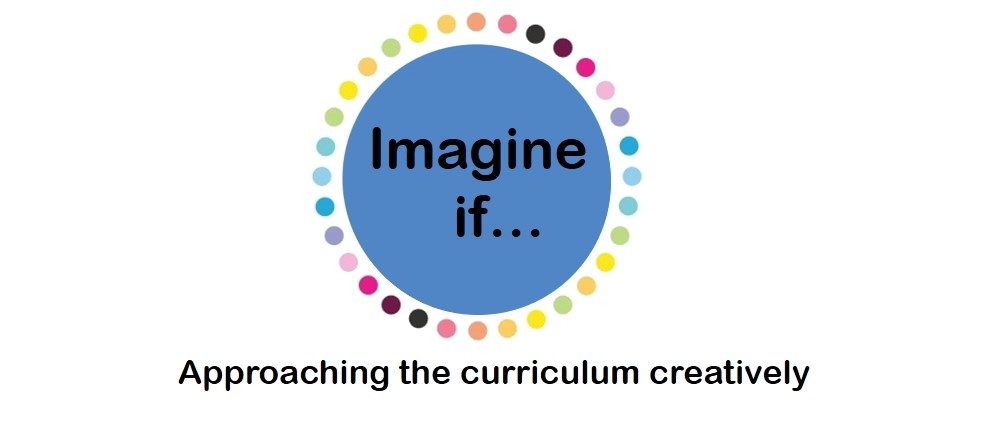
How we really listened to learners at a recent National Creative Learning Network event
Each year at its annual event, the National Creative Learning Network takes a current priority in education and works with local authority colleagues to explore it through the lens of creativity. In previous years, we have focused on attainment; skills development, and equity. This year, our attention turned to the curriculum – ‘curriculum’ meaning the totality of our education offer to young people. We wanted to know what they think of it and to talk about how it might be improved.
Our two ‘must haves’ were:
Our aims were to:
Imagine If…..workshops
Key to the success of the day, was the involvement of children and young people. Education Scotland’s Creativity Team devised a workshop that took place in Friockheim and Arkleston primary schools and Calderglen secondary school prior to the event. As expert ‘users’ of the education system, learners were asked to draw on the best and worst of their experiences, and use blue sky thinking to imagine their ideals, and to generate ‘Imagine if….’ statements to share their views and ideas.
Learner voice
Creative Learning Plan Chair, Christine Pollock, invited fifteen young people representing the three schools to take to the stage.
Delegates heard from pupils about their very positive experiences of undertaking a Civil Engineering Foundation Apprenticeship, which means they spend a third of their time in school, a third in college and a third with an employer. Being able to make clear links between all three was motivating for them and they spoke with confidence and purpose.
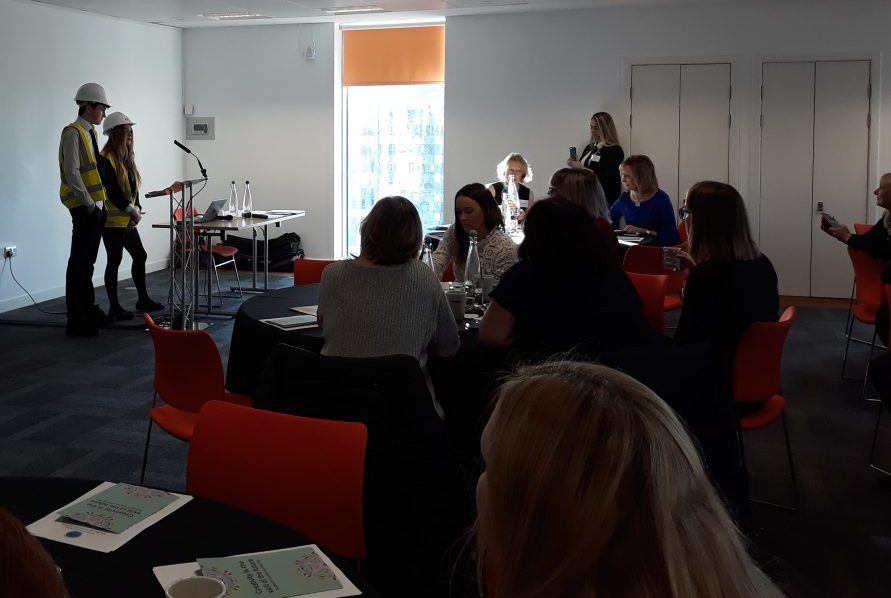
Next up, primary and secondary learners shared their own and their peers’ ‘Imagine if’ statements, which were at once funny, ambitious, thought provoking, profoundly moving and wonderfully creative. Here are just a few examples:
Imagine if the school was on a cruise and you learnt going to every country in the world and experiencing the culture.
Imagine if every day felt the same as when I got selected for the soccer sevens.
Imagine if school didn’t put massive pressure on exams. Imagine if it was OK to fail.
Imagine if instead of schools we learned through experiencing new things – through using creativity to work things out on our own.
Imagine if school was about skills, experiences, opportunities for everyone regardless of talent or ability. Each pupil reaches their own personal targets.
Imagine if we could always feel the buzz of inclusion like school shows and fundraising events.
Imagine if there were new ways to meet new people every day and to be able to develop with them.
Delegates reflected on and discussed their responses to the young people’s statements, and had the opportunity to ask further questions of the learners who joined table discussions as equals. Facilitated by a CLN coordinator (local authority creative learning lead), each group was invited to identify a key theme they would like to put forward for the focus of deeper discussion in the afternoon.
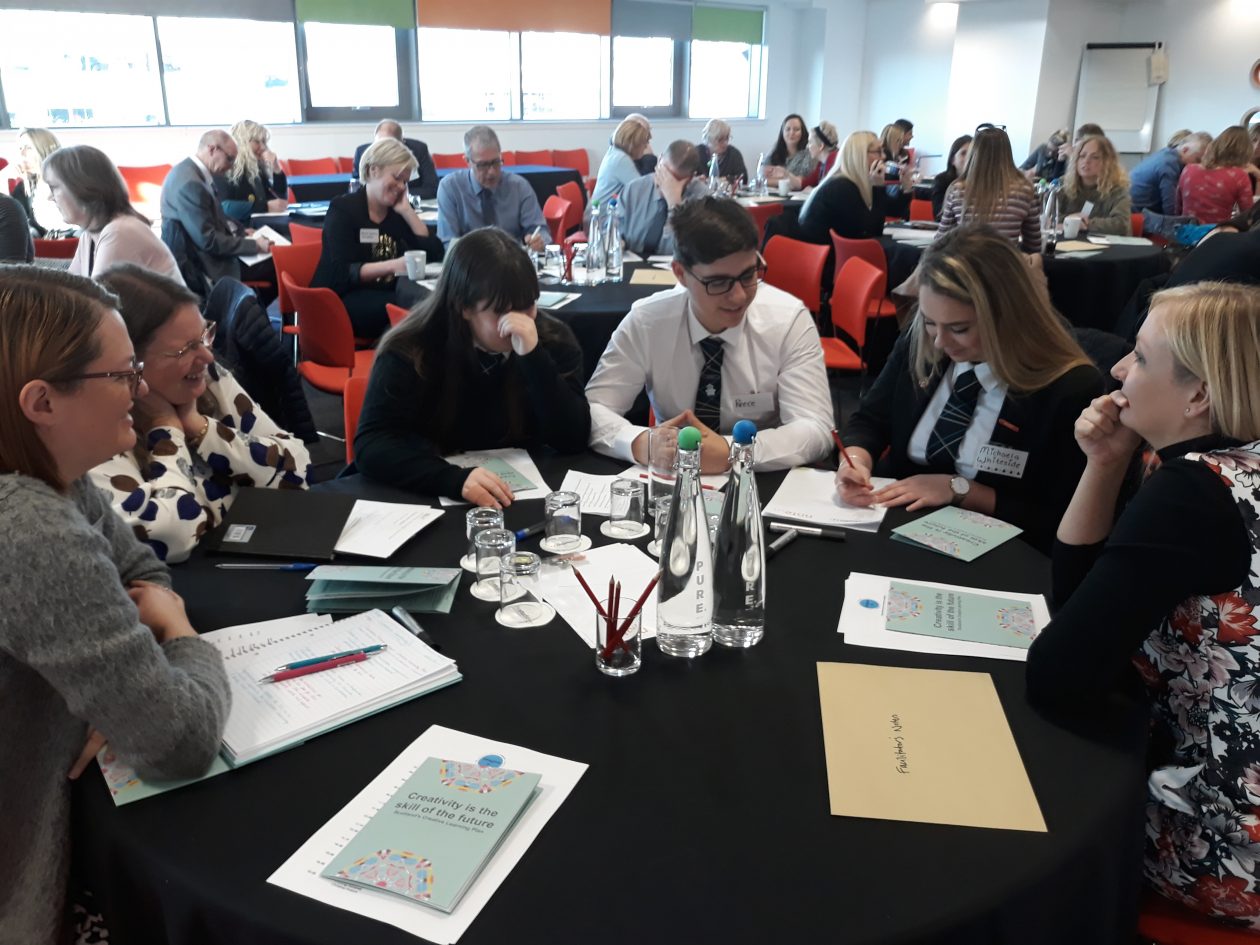
Emerging themes for afternoon workshops were:
Delegates self-organised into themed workshops groups, each of which was led by a facilitator who used creative tools and techniques, and drew on the views of the young people, to support exploration of their specific theme.
Through a final reflection, we discovered that the following themes had been discussed across a number of the workshop groups:
To help close the event Calderglen pupils were invited to share:
They took the opportunity to thank everyone, and to say how surprised they had been by how open and receptive everyone was – they really felt listened to. They were surprised more young people from other schools were not there and suggested we have just as many young people as adults – a challenge for future events.
In order to encourage ongoing engagement following this event, we invited one of the young people to issue the call for feedback, and delegates were asked to share what they promised to do in the next week, and in the next six months. Our commitment is to share actions resulting from these actions via Twitter so that the young people can see what has resulted from their contributions.
In the next week, I promise to…
In the next six months, I promise to…
For us, the standouts were:
‘An excellent, thought provoking and inspiring conference. The young people’s voice and the importance of this was a highlight of the day.’ Participant
‘The young contributors were fantastic. They were really clear about what they felt they needed from school education and teachers and also about what they had to give’. Participant